- Home
- Mordecai Richler
Son of a Smaller Hero Page 13
Son of a Smaller Hero Read online
Page 13
“Nobody seems to be asking you to worry about anything,” Theo said. “But we’ve got a reputation. You’re moving out, Noah. Right away. I refuse to allow Miriam to see you again.”
“We’re not having a dirty little affair, Theo. You’ve got a reputation, but Miriam and I are in love. I’m going, but she comes with me.”
“You’re mad!”
Theo tried to turn away from him but Noah blocked his path.
“Ask her.”
They both turned to Miriam.
Miriam stared back at them with terror. Noah’s ruthless manner alarmed her and yet she felt more disgust than compassion for Theo. Oh, if only she were dead. Would they wait? She looked first at Theo and then at Noah. No, he wouldn’t. Noah reached for his jacket. He had been slighted once before. “No,” Miriam said, surprised at her own voice. “Don’t. I – Theo, I’m sorry, I – I’m in love with him.…”
Theo stifled a sob. He swung back as though to hit Noah, shut his eyes, tottered, and collapsed on the floor.
“He’s fainted,” Noah said.
“You were so cruel, Noah. I never …”
“He’s fainted,” Noah said stupidly. “He … I did – Miriam,” he said, pulling her to him desperately, “we must love each other truly. We … He’s fainted.”
Miriam stared at him disconsolately. She held her hand to her cheek. She was frightened.
3
Spring 1953
TO UNDERSTAND WHAT A FINE PLACE MONTREAL IS when spring is coming you must know the winters that come first. Chill grey mornings; sun bright in the cold noon sky but giving off no heat to speak of; skies darkening again early in the afternoon; long frosty nights with that window-banging wind whipping in burning hard from the north, pushing people before it like paper, making dunes and ridges that hurt the eye to look at on the mountain snows, burning children’s cheeks red and cutting like a knife across flat frozen ponds. Old men blowing on their wrinkled hands, boys with blue lips, and women with running noses all huddled up and knocking their feet together in the bitter cold waiting for liquor commissions to open and banks to shut, late dates, streetcars.…
So when the first rumours of thaw reach the city everybody is glad. That first rumour, coming towards the end of February, is usually hidden away in the back pages of the newspapers. It says that two government icebreakers, the Iberville and the Ernest Lapointe, have started poking their way up the frozen St. Lawrence towards Montreal. That’s a while before the NHL hockey play-offs, and most people on the streetcars are talking about how the players are moving slow because of the heat. The resorts up north stop advertising themselves as the St. Moritz or Davos of Canada: they begin to talk of the sun, their pamphlets saying how so many happily married couples first fell on their beaches. That first thaw is a glory. The big snow heaps on Fletcher’s Field and a whole winter’s caboodle of snowmen begin to shrivel and shrink away. Giant sweepers roar up and down the streets wiping a winter’s precautionary sands off the pavement. You can make out chunks of yellow grass here and there like exposed flesh under the shrinking slush that still sticks to the flanks of Mount Royal. Occasionally, it snows: but noon comes and all the gutters are gurgling again. There is a green, impolite smell to the streets.
With the first thaw the change takes hold: there is a difference to everything, the difference between a clenched fist and an open hand. The kids get out on their roller-skates and make most side-streets a hazard. Belmont Park opens, so do the race tracks. Ships steam into port from Belfast and Le Havre and Hamburg and Liverpool and Archangel and Port-of-Spain. NDG organizes softball teams, the ladies of Westmount plan their flower-shows, and the Jr. Chamber of Commerce sets aside one week as Traffic Safety Week. The man who reviews books for the Star will say that spring is here but J. P. Sartre is without that traditional Gallic charm, and young writers aren’t cheerful enough. But best of all is St. Catherine Street on an April evening. Watch the girls, eh, their hair full of wind, as they go strolling past in their cotton print dresses. Men, sporting smart suits and spiffy ties, waving enticingly at them. See the American tourists having a whale of a time frantically, a Kodak strapped to one arm and a lulu of a wife to the other.… Kids wandering in and out of the crowds yelling rude things at girls older than themselves.… Sport fans clustering at corners waiting for the Gazette to appear.…
In parks, playgrounds, and on Mount Royal, tattered men with leather faces loll on benches, their faces upturned to the sun. Maiden aunts hopeful again after a long winter’s withering knit near to baby carriages which hold the children of others. Come noon, lovers freed from the factory sprawl on the green mountainside while the children tease and the tattered men watch laconically and the maiden aunts knit near to baby carriages that hold the children of others.
Everybody is full.
Now that Melech Adler was without work he did not know what to do with all his days. He still started off his morning by reading the obituary column in the Jewish Star, but the death of old friends no longer made him sad. He still attended services in the synagogue every evening but the other old men avoided him. Melech Adler made many crude jokes about death, and they thought him morbid. He had begun to read the illustrated magazines and daily papers. Here he read of a strange and unlikely world, their world, wherein crimes were committed for the sake of passion and men had mistresses and were not afraid of being judged. Then, likely as not, he would turn to Jenny. Their old men had young women. They hadn’t devoted all their lives to their families. He recalled the stories that he had heard about Greenbaum and the young French Canadian girls who did piece-work in his factory. What if Greenbaum outlives me, he thought. He prayed harder. He remembered those beautiful evenings, long ago, in the home of Jacob Goldenberg the Zaddik, and cursed himself for having been so shy then, for having been too overawed by the other man’s holiness to ask questions. Jacob, may he rest in peace, had used to tell of the trials of the Baal Shem Tob so wonderfully well. Oh, to be a man of God. He remembered his pious father, the scribe, who had written many Torahs by hand. I could have been a scribe too, he thought nostalgically. I didn’t go against him. I renounced Helga, who clapped her hands together when she sang.
Every afternoon Melech Adler locked himself up in his office for two hours and Wolf sat outside and wondered.
“Nu, Jenny, you know what they call their children? Byron, Cecil. Are these Yiddish names? Do dey come to visit us any more on Sundays? They go to Plattsburg. Nurses they get for the children. My missus wishes to kiss her own grandchildren so it ain’t sanitary. I should retire, Max says. What …”
“Max means everything good,” Jenny said gently.
“Max. We got him for a prime minister in the family. I should retire, yeah? Go to Plattsburg? Go to the beach to look at naked women? Me, I work. I worked hard. So what do I get for a thank you? Leah is ashamed for the coal yard. Who paid – I’m not saying nothink, he was a fine man – but who paid her fodder’s funeral? Ida hangs the walls with movie stars. And Shloime? Shloimi is a …” Mr. Adler began to cough. He no longer visited Panofsky because he was ashamed of what had happened. He cleared his throat and took another sip of tea.
“Shloime will learn,” Jenny said. “He’s young yet. He …”
“He’ll learn is right.” Melech got up. “Right now – for a fact – I’m going to teach him his first lesson.”
“Melech. Please, Melech.…”
But he had already loosened his trouser belt and started up the stairs.
“If you ask me,” Wolf Adler said, putting his Coke down on the counter and wiping the crumbs off his lips, “if you ask me, Karl, doctors don’t know from their ass to their elbows. Look, your paw got hit over the head so they sew him up and say, goodbye, good luck, I’ll send you a bill in the mail. But he’s not the man he was, is he? Just between you me and the lamp-post, he’s not the same guy. Take my wife now. They tap her chest and take samples of this and X-rays of that but so what – so what? You’re as good as gold, Mrs.
Adler. That’s what they say. Honest. But she says she’s sick and she oughta know. So if you ask me – and I’ve had experience let me tell you – if you ask me, doctors should be taken with a grain of salt. Certain diseases are still a mish-mash to them.”
Karl unscrewed the top of the biscuit jar, took out a chocolate biscuit and offered one to Wolf. Then, overturning his Coke bottle, he downed his drink in three quick gulps. “Poison,” he said, popping a mushy chocolate biscuit into his wet, wide-open mouth. His jaw clamped shut and the biscuit crumbled, bits of brown fluid trickling down the sides of his fat pink lips. He wiped his lips clean on the sleeve of his soiled white shirt, and burped loudly.
Wolf grinned. He gobbled down his biscuit, then slipped his thumb into his mouth and picked a sliver of crust free of a tooth.
The boy came in with Karl’s Gazette, and the two friends split the paper wordlessly. Karl took the sports section.
Panofsky’s was buzzing. Men crowded around the two bridge tables which had been set up near the Coca-Cola freezer. Gin rummy was being played at one table and pinochle at the other. Most of the men were jacketless and two of them, who lived right around the corner, were wearing their slippers. Their talk was easy and their jokes were familiar. They had known each other for years, and most of them were related in one way or another. They, the sons, were still orthodox. The synagogue was a habit and a meeting place for them. The Goyim, a mystery. Something to talk about. They were substantial men. Extremely good to their wives and enormously fond of their children. They worked hard all week. Sunday was their night.
Kravitz, the grocer, grinned broadly. “Gin,” he said.
It was a warm, spring night. The door was kept open.
“Hey,” Karl said. “This column. Liss’n, Wolf. ‘City Councillor Max Adler and an unnamed blonde made a cosy twosome at the Chez Paree last night. Canvassing votes, Max? …’ Unnamed blonde yet. I should have such troubles. Your brudder Maxie is some b.t.o.”
“Look, Karl, those kind of dames mean trouble with a capital T. Here, listen what I just read. Bing Crosby’s wife has died. According to the laws of California that means he has to pay taxes on her share of his property. In other words, a cool million. So what happens? He hasn’t got it. He’s got to mortgage his horses and his yacht and his farm. I’ll bet you tonight Bing Crosby wishes that he was just a little guy again. Money means troubles. Max is growing too fast. He owns who knows how many cottages up in Ste. Agathe now. But five’ll get you one that he couldn’t raise a G overnight. Everything’s tied up. Comes a depression and first thing you know no more la-de-da in the mountains at four hundred uckbays a cottage. Bango! No more unnamed blondes. And what, tell me, if the blonde has clap? Max isn’t so happy as people think. More than anything he’d like to have a kid. Always he’s asking me where’s Noah. Me, I’d rather stay with my father. I told you what happened with the derrick last winter? So. What if I hadn’t been around to save him? Plunk would have gone three tons of scrap on his head.” Wolf paused. Again he stood by the open door of the inner office, the strong-box almost within reach. “And as far as Noah goes – this is just between us, you know – but … what I hear, he’s in deep with the dames too.”
“Give, give. What do you hear?”
“I hear.”
All talk stopped suddenly.
Wolf looked at the card-players and then followed their gaze to the open door. His eyes met Shloime’s. Shloime grinned.
Karl picked up an empty Coke bottle. “Out,” he said.
“I wanna speak wid my brudder.” Shloime twirled his key chain. “You got a law against that, Mr. Soda Jerker?”
Kravitz got up and began to walk towards the door. He was a big man.
“No, wait,” Wolf said. “I’ll speak to him outside.”
“Listen, boychik,” Kravitz said, “you keep away from this store if you know what’s good for you. Capish?”
“You a communist too, Kravitz? I don’t know what happened to Panofsky. But I hear stories. Maybe us young guys don’t like commies so good? Who knows?”
Kravitz came closer and Shloime backed away. Wolf pulled Shloime outside.
Wolf was sweating. “All right. What do you want?”
“Liss’n. Paw is crazy or sumptin. He’s having a fit. He just kicked me out of the house – for good. He says it was me yet who robbed Panofsky. He’s gone mad. I tell you. You should see him. He ripped up all my pictures and magazines because they’re full of naked women he says.”
“All right. What do you want from me?”
“Look, Wolf. Let’s make it short and sweet. I’m broke and I want fifty bucks.”
“Liss’n, Shloime – man to man – I am a guy who doesn’t take sides. Fifty bucks is nothing. But I give it to you – well, that’s like giving it against Paw. As far as I’m concerned you can do what you like, but I don’t want to get involved.”
“That’s all I wanted to know. Goodbye, sucker. But I’ll fix you too. I’ll fix the whole bunch. I hate them. You included.”
Wolf watched bewildered as Shloime walked away into the warm, spring night. I would never steal, he thought. I’m a Jew. But he almost admired Shloime for stealing. That’s something they do. He passed his hand through his hair, and then stared at his hand. Leah was really sick now. Wolf could not understand why he had such awful luck. Everybody likes me too, he thought. I mind my own business. I never say a bad word against a person. I go to the synagogue. Why can’t people let me alone, he thought. What did I ever do wrong?
A car whirled around the corner, but Wolf didn’t notice. It was Ida and Stanley. Stanley, who worked as a cutter in the Knit-to-Fit, owned a ’38 Buick. He parked a short way down from Ida’s house, away from the lamp-post light. He tried to slip his hand under her skirt, but she stopped him quickly.
“A girl’s gotta think of what people say,” she said. “You’ll give me a rep for being hot.”
“Everybody does it but.”
“Look, mister. We’re not going the limit until after we’re married. I’m no Ettie Firstein. Be good, Stan, please. I want you to respect me.”
“But we’re going steady, kiddo. Ask anybody but.”
“Stan. Pul-eeze. People can see us.”
“I’m so horny, kiddo. I’m crazy about you but.”
“That makes me the rabbi of a French glue factory in Japan.”
“Let’s go inside.”
“You crazy!”
So they sprawled out on the sofa in the living-room.
“Stan, when are we going to get married?”
“Soon, soon. But do you think Max’ll gimme a job? Christ. I’d like to be an operator like him. Why don’t you introduce me, eh?”
“Stan. Don’t, Stan. I’m scared stiff.”
“It’s just your sweater but. C’mon, everybody does it.”
After he had gone Ida sat down on the sofa and lit a cigarette – the first that she had ever smoked. The cigarette made her feel sweetly remorseful. She began to suspect that there were many more pleasures and many fewer punishments than those catalogued in the law according to Melech Adler. She stepped outside and sat down on a chair on the balcony. There was still that pain in her stomach. The night had already begun to fade and there was a rumour of dawn in the sky. Dizzy but calm, she was aware of smoke fumes forming sensual around her. When the cigarette was finished she suffered from a poignant sense of loss, almost as if a death had occurred, and she soon longed for another.
II
Soon after St. Jerome, a prosperous French Canadian mill town with a tall grey church, the horizon widens and the highway begins to rise, rise and dip, rise again from the valley and into higher hills. Sloping easily on all sides are the slow, pine-rumpled hills. Old and shrivelled cliffs appear like bruised bones here and there, and in the valleys below, the fertile fields are yellow and green and brown. There is the occasional unpainted barn or silo – blackened by the wind and the rain – rising out of the landscape as natural as rocks. Billboards, more
modern, stick out of the earth incongruously. The slim and muddy river, sheltered from the sun by birch and bush, winds northwards drowsily but insistent between the still hills. Cottages – a mess strewn on a hilltop or a pile of them spilled sloppily into a valley – appear every ten miles or so. From time to time, as the highway climbs higher north, some ambitious cliff or hill pokes into the soft underbelly of a low grey cloud. These higher hills, sometimes called mountains, are often ribbed by ski-tows, trails, and the occasional derelict jump. Bears, the stray deer or two, are often rumoured in these parts, but, like the pretty girls who beckon from the travel brochures, they are seldom seen.
About forty-five miles north of Montreal a side-road turns up off into Ste. Adele en-haut. It’s about three miles to the lake. Ste. Adele is the retreat of Montreal’s aspiring middle-class, and, as a resort town, is prone to all the faults and virtues of that group. The cottages are clean but prosaic: no Jews are wanted, but, on the other hand, they are dealt with diplomatically. The French Canadians tolerate the Presbyterians from the city because they have brought prosperity to their village, and the Presbyterians find that the French Canadians add spice to their holiday: they accept their haughtiness as philosophically as rain on Sundays. Few on either side are bilingual.
The pinewood cottage they had rented was about five miles off the highway, pretty high in the hills and by the side of a mountain stream. It had three bedrooms and an open fireplace in the living-room. There was a rock-garden of sorts around by the front and a fine breeze by the stream. The old, musty furniture had been picked up at auction sales many years ago and was bruised in a warming, familiar way.
Noah and Miriam had had a busy week before coming up to the cottage.
They had moved, temporarily, into Mrs. Mahoney’s and they bought a ’41 Ford for three hundred and fifty dollars. Marg Kennedy phoned on Wednesday and asked Miriam to meet her for a drink. Marg was a quick attractive woman who earned more money than her husband and was interested in child psychology. She wrote commercials for a soap company. John, who had got over being a socialist, worked in an advertising agency. The Kennedys were buying a duplex on the instalment plan and planned to have three children, spaced over six years. Miriam met Marg at the Ritz on Sherbrooke Street. That quiet bar is one of the most fashionable in Montreal. Entering the bar, which she had accepted as something nice long ago, Miriam suddenly remembered that first afternoon when Noah had called and she had known instinctively that he would find her sophistication hard. She gazed at Marg, who sipped the correct drink and wore the right dress. This is how I must have appeared to Noah at first, she thought. She was afraid. Marg waved, Miriam smiled. Smiled, and realized with a certain sadness, that this friendship of so many years had lapsed.

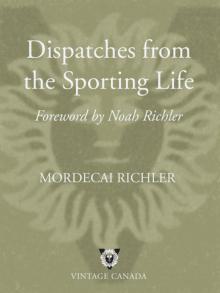 Dispatches From the Sporting Life
Dispatches From the Sporting Life The Acrobats
The Acrobats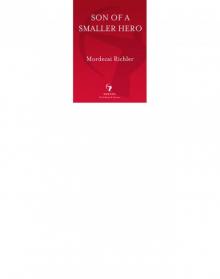 Son of a Smaller Hero
Son of a Smaller Hero Jacob Two-Two-'S First Spy Case
Jacob Two-Two-'S First Spy Case Jacob Two-Two Meets the Hooded Fang
Jacob Two-Two Meets the Hooded Fang Jacob Two-Two and the Dinosaur
Jacob Two-Two and the Dinosaur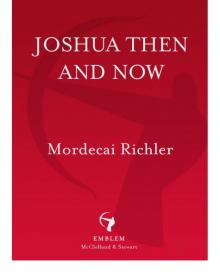 Joshua Then and Now
Joshua Then and Now Solomon Gursky Was Here
Solomon Gursky Was Here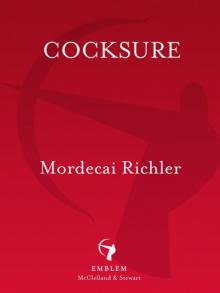 Cocksure
Cocksure The Street
The Street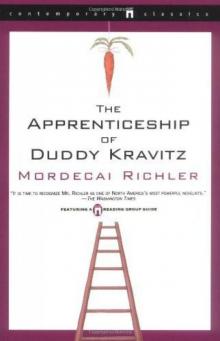 The Apprenticeship of Duddy Kravitz
The Apprenticeship of Duddy Kravitz A Choice of Enemies
A Choice of Enemies Barney's Version (Movie Tie-In Edition)
Barney's Version (Movie Tie-In Edition) St. Urbain's Horseman
St. Urbain's Horseman The Incomparable Atuk
The Incomparable Atuk Barney's Version
Barney's Version